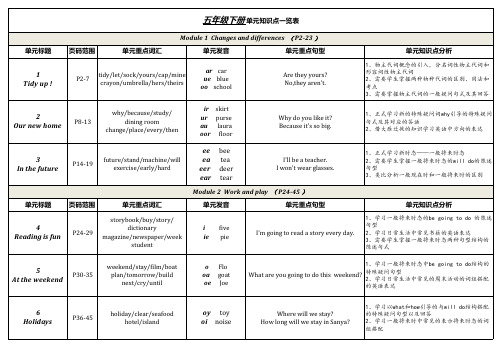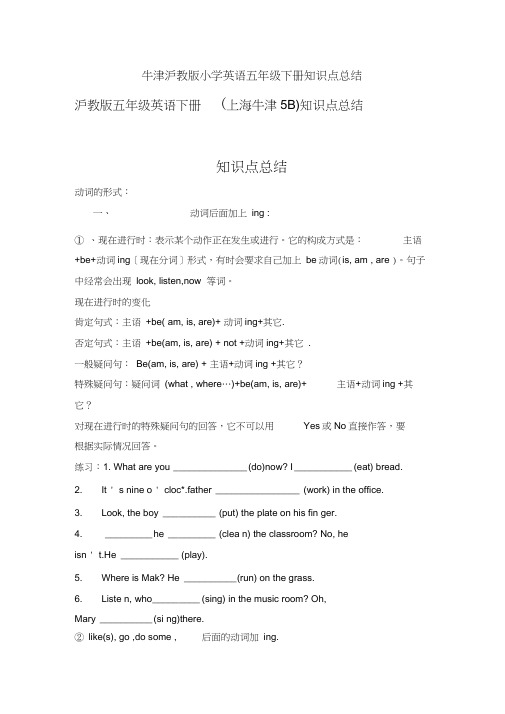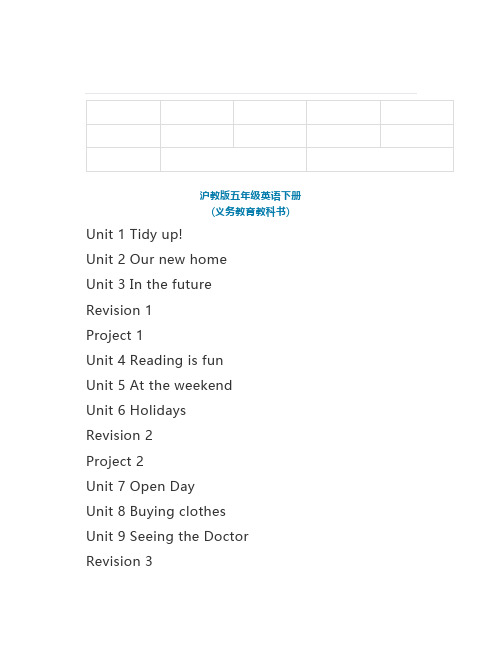沪教牛津版五年级英语下册各单元知识清单
沪教牛津版五年级下册单元知识点一览表

1、学习以what和how引导的与will do结构搭配 的特殊疑问句型以及回答 2、学习一般将来时中常见的表示将来时态的词 组搭配
单元标题
7 Open day
页码范围
单元重点词汇
P46-51
meet/school gate/art room hall/finally/meeting room
show
五年级下册 单元知识点一览表
单元标题
1 Tidy up !
页码范围
单元重点词汇
Module 1 Changes and differences ( P2-23 )
单元发音
单元重点句型
P2-7
tidy/let/sock/yours/cap/mine crayon/umbrella/hers/theirs
1、正式学习新时态——一般将来时态 2、需要学生掌握一般将来时态的will do的陈述 句型 3、类比分析一般现在时和一般将来时的区别
单元知识点分析
1、学习一般将来时态的be going to do 的陈述 句型 2、学习日常生活中常见书籍的英语表达 3、需要学生掌握一般将来时态两种句型结构的 陈述句式
You should take some medicine. You shouldn't go to bed late.
1、学习日常生活中常见的不适症状以及需要注 意事项的英语表达 2、进一步学习以情态动词should引导的表示建 议的祈使句型
Module 4 Things we enjoy ( P68-87 )
1、学习日常生活中常见的节假日的英文表达
11 Chinese fesivals
P74-79
festival/important/call end/village/last
2020春沪教牛津五年级英语下册教学资料- Module 1 知识清单

Module Changes and differences一、核心词汇1.名词性物主代词yours你的;你们的mine我的hers她的theirs他们的;她们的;它们的2.名词sock短袜 cap帽子crayon彩色蜡笔(或粉笔、铅笔)umbrella伞place地方future将来;未来machine机器exercise运动;锻炼;活动3.动词let让stand站;站住will将;将会4.副词why为什么then然后early早;提早hard努力地5.兼类词(双重词性)tidy整理;整洁的change改变;变化study书房;学习6.其他because因为every每;每个7.短语dining room餐室;餐厅二、拓展词汇1.名词nail钉子second秒(时间单位)mess脏乱;不整洁2.动词drop使落下;掉落stick粘贴;粘住3.形容词enough足够的more更多的4.副词twice两次easily容易地5.兼类词(双重词性)north北方;向北south南方;向南6.短语tidy up把……整理好(be) full of装满……;充满…… a few几个;一些wild goose大雁(复数wild geese) in the future将来in front of在……前面take a photo拍照wear glasses戴眼镜(be)weak in不擅长not … any more不再all day 一天到晚do exercise做运动三、核心句型1.— Are they yours?它们是你的?— No, they aren’t. 不,它们不是。
解读: 问句是一个一般疑问句,用来询问某物的归属,有肯定和否定两种回答。
举一反三: — Are these crayons yours?这些蜡笔是你的吗?— No, they aren’t. 不,它们不是。
— Is this umbrella Tom’s? 这把伞是汤姆的吗?— Yes, it is. 是的,它是。
知识清单(素材)沪教牛津版(深圳用)英语五年级下册(1)

_____________ 5B复数:要表示一个以上概念时,要用名词复数形式如book--books ( 书 ) desk--desks ( 书桌 )如box--boxes ( 盒子 ) bus--buses(公共汽车)如city--cities(城市) country--countries( 国家)如:day--days(天),boy--boys(男孩)如tomato-tomatoes(西红杮)potato-potatoes(土豆)1) 元音字母发变化。
如man--men(男人) , woman--women(妇女)mouse--mice(老鼠) , policeman--policemen(警察) policewoman--policewomen(女警察)2) 词尾发生变化。
如child--children(小孩) , ox--oxen(公牛)3) 单、复数形式相同。
如fish--fish(鱼) ,sheep--sheep(绵羊) ,deer--deer(鹿) ,Chinese--Chinese(中国人) ,yuan--yuan(元) ,注意不说an English,要说an Englishman.①fish作鱼肉讲时不可数名词,没有复数。
②fishes指各种不同种类鱼或指几条鱼。
时间,He likes watching TV. 他喜欢看电视。
He doesn’t like watching TV.Does he like watching TV?Yes, he does. /// No, he doesn’tShe has lunch at twelve. 她十二点吃午餐。
She doesn’t have lunch at twelv e.Does she have lunch at twelve?Yes, she does. /// No, she doesn’t.It looks like a cat. 它看起来像只猫。
牛津沪教版小学英语五年级下册知识点总结

牛津沪教版小学英语五年级下册知识点总结沪教版五年级英语下册(上海牛津5B)知识点总结知识点总结动词的形式:一、动词后面加上ing :①、现在进行时:表示某个动作正在发生或进行。
它的构成方式是:主语+be+动词ing〔现在分词〕形式,有时会要求自己加上be动词(is, am , are )。
句子中经常会出现look, listen,now 等词。
现在进行时的变化肯定句式:主语+be( am, is, are)+ 动词ing+其它.否定句式:主语+be(am, is, are) + not +动词ing+其它.一般疑问句:Be(am, is, are) + 主语+动词ing +其它?特殊疑问句:疑问词(what , where…)+be(am, is, are)+ 主语+动词ing +其它?对现在进行时的特殊疑问句的回答,它不可以用Yes或No直接作答,要根据实际情况回答。
练习:1. What are you ______________ (do)now? I ___________ (eat) bread.2. It ' s nine o ' cloc*.father ________________ (work) in the office.3. Look, the boy __________ (put) the plate on his fin ger.4. _________ he _________ (clea n) the classroom? No, heisn ' t.He ___________ (play).5. Where is Mak? He __________ (run) on the grass.6. Liste n, who _________ (sing) in the music room? Oh,Mary __________ (si ng)there.②like(s), go ,do some , 后面的动词加ing.如:1.1 like (play ) football, but my father likes (play) chess.2. ____________ Let ' s go wim).二、动词后面加s/es.这就有关一种时态:一般现在时。
完整word版牛津英语五年级下册知识点整理

牛津英语上海版五年级下册知识点整理Module1 Using my five sensesUnit1 What a mess生词:notebook paints crayon school bag tape glue brush音标:语法:Whose...? It's mine/yours/his/hers/ours/theirs. They're...Unit2 Watch it grow 生词:dogpuppy duck butterfly chick chicken duckling caterpillar语法:...was/were...Unit3 How noisy 生词:motorbike bus car drill lorry音标:?? ///??/ suretoy boy oy ure our enjoy joytour oor join oi noisepoor pointtoilet语法:...did...牛津英语上海版五年级下册知识点整理Module2 My favorite thingsUnit1 Food and drinks生词:Meat: pork beef chicken fishVegetables: tomatoes potatoes carrots cabbages beansFruit: apples oranges bananas grapesStaple Food: rice noodles breadDrinks: juice water milk tea语法:What did you have for...? I had...FilmUnit2生词:seat ticket ticket office entrance exit语法:Shall we...Unit3 school subject 生词:Music Maths Chinese English Art IT PE牛津英语上海版五年级下册知识点整理Module3 Things around usUnit1 Signs生词:telephone toilet restaurant exit entranceNo smoking No swimming Don't litter Don't walk on the grass音标:/r//l/ redl radio like late r grassblack grow blouse语法:What does this sign say/mean? It says/means wecan/can't/mustn't/shouldn't..Unit2 Weather 生词:rain/rainy wind/windy Cloud/cloudy sun/sunny ℃/thirty degrees 30snow/snowy storm/stormy fog/foggy音标:/e/ θ/ / these think th they ththird father mouth mother month语法:What's the weather like? What's the temperature?It's...(weather).It's...(temperature).Unit3 Changes 生词:sofa cushion bed mirror lamp bookshelf Cupboard语法:What can we do?牛津英语上海版五年级下册知识点整理Module4 More things to learnUnit1 Museum生词:Science museum art museum history museumInsect museum car museum railway museum语法:Which museum do you want to visit?I want to visit ...Why?Because...Unit2 Western holiday生词:Christmas Easter Halloween Thanksgiving 语法:When is ...? It's on ... What do people do on this holiday?Unit3 story time 生词:castle giant。
沪教牛津版(深圳)五年级下册知识点

沪教牛津版(深圳)小学英语知识点精析五年级下册名词性物主代词后面省略名词,说明“物主”是谁,能单独使用。
例如:This classroom is ours.这间教室是我们的。
3.一般疑问句简介一般疑问句是以be(动词)、情态动词或助动词开头,通常用yes或no来回答的句子。
它的基本结构是:Be(动词)/情态动词/助动词+主语+其他?例如:Are you Lily?你是莉莉吗?Can you speak English?你能讲英语吗?Do you like the book?你喜欢这本书吗?4.what开头的感叹句【课文应用】What a mess!真是一团槽!what在感叹句中修饰名词。
因为名词有可数和不可数之分,所以what开头的感叹句有两种结构:(1)What a/an+形容词+可数名词单数(+主语+动词)!例如:What a clever boy(heis)!(他是)多么聪明的一个男孩儿啊!What an interesting film(itis)!(它是)多么有趣的一部电影啊!(2)what+形容词+可数名词复数/不可数名词(+主语+动词)!例如:What good students(they are)!(他们是)多么好的学生啊!5.询问对方能否做某事的句型—Can you…?【课文应用】Can you put them on his bed?你能把它们放到他的床上吗?【句型结构】问句:Can you+动词原形+(其他)?答语:Yes,I/we can./No,I/we can't.【重点解析】问句用于询问对方能否做某事。
与情态动词can搭配使用的动词用原形。
例:-Can you pass me a glass?你能递给我一个玻璃杯吗?-Yes,I can.是的,我能。
6.see的用法【课文应用】Jimmy sees a small box on the table.吉米在桌子上看见一个小盒子。
沪教版五年级英语下册(上海牛津5B)知识点总结

沪教版五年级英语下册(义务教育教科书) Unit 1 Tidy up!Unit 2 Our new homeUnit 3 In the futureRevision 1Project 1Unit 4 Reading is funUnit 5 At the weekendUnit 6 HolidaysRevision 2Project 2Unit 7 Open DayUnit 8 Buying clothesUnit 9 Seeing the Doctor Revision 3Project 3Unit 10 Great inventionsUnit 11 Chinese festivalsUnit 12 The giant‘s gardenProject 4知识点总结动词的形式:一、动词后面加上ing :①、现在进行时:表示某个动作正在发生或进行。
它的构成方式是:主语+be+动词ing〔现在分词〕形式,有时会要求自己加上be动词(is, am , are )。
句子中经常会出现look, listen,now……等词。
现在进行时的变化肯定句式:主语+be( am, is, are)+动词ing+其它.否定句式:主语+be(am, is, are) +not +动词ing+其它. 一般疑问句:Be(am, is, are) +主语+动词ing +其它?特殊疑问句:疑问词(what , where…)+be(am, is, are)+主语+动词ing +其它?对现在进行时的特殊疑问句的回答,它不可以用Yes或No直接作答,要根据实际情况回答。
练习:1. What are you _________(do)now? I___________(eat) bread.2. It’s nine o’clock.. Myfather_______________(work) in the office.3. Look, the boy____________(put) the plate on his finger.4. __________he__________(clean) the classroom? No, he isn’t.He____________(p lay).5. Where is Mak? He___________(run) on the grass.6. Listen, who___________(sing) in the music room? Oh, Mary___________(sing)there.②like(s), go ,do some , 后面的动词加ing.如:1. I like (play ) football, but my father likes (play) chess.2.Let’s go (swim).二、动词后面加s/es. 这就有关一种时态:一般现在时。
沪教牛津版英语五年级下册

沪教牛津版英语五年级下册一、教材概述沪教牛津版英语五年级下册教材延续了上册的主题和语言结构,同时在内容和难度上有所提升。
教材涵盖了听、说、读、写四个方面的技能训练,注重培养学生的综合语言运用能力。
二、单元结构每个单元由以下几个部分组成:1.Look and learn:呈现本单元的重点词汇。
2.Listen and say:通过对话形式呈现本单元的重点句型和语法。
3.Ask and answer:以问答的形式巩固重点句型。
4.Read a story:一篇有趣的故事,培养学生的阅读理解能力。
5.Learn the sounds:学习语音知识。
6.Do a survey:通过调查活动,培养学生的语言运用能力和合作精神。
三、重点词汇1.动物类:tiger, lion, panda, monkey, elephant等。
2.颜色类:red, blue, green, yellow, purple等。
3.数字类:one, two, three, four, five等。
4.动词类:run, jump, swim, fly, play等。
5.形容词类:big, small, long, short, beautiful等。
四、重点句型1.What's your favourite animal? My favourite animal is...2.What colour is it? It's...3.How many... are there? There are...4.What can you do? I can...5.Can you...? Yes, I can. / No, I can't.五、语法知识1.名词的单复数形式。
2.一般现在时的肯定句、否定句和疑问句。
3.形容词的比较级和最高级。
六、学习建议1.多听多读:通过听录音、朗读课文等方式,提高英语听说能力。
2.积累词汇:背诵重点词汇,扩大词汇量。
- 1、下载文档前请自行甄别文档内容的完整性,平台不提供额外的编辑、内容补充、找答案等附加服务。
- 2、"仅部分预览"的文档,不可在线预览部分如存在完整性等问题,可反馈申请退款(可完整预览的文档不适用该条件!)。
- 3、如文档侵犯您的权益,请联系客服反馈,我们会尽快为您处理(人工客服工作时间:9:00-18:30)。
沪教牛津版五年级英语下册知识总结Module Changes and differences一、核心词汇1.名词性物主代词yours你的;你们的mine我的hers她的theirs他们的;她们的;它们的2.名词sock短袜 cap帽子crayon彩色蜡笔(或粉笔、铅笔)umbrella伞place地方future将来;未来machine机器exercise运动;锻炼;活动3.动词let让stand站;站住will将;将会4.副词why为什么then然后early早;提早hard努力地5.兼类词(双重词性)tidy整理;整洁的change改变;变化study书房;学习6.其他because因为every每;每个7.短语dining room餐室;餐厅二、拓展词汇1.名词nail钉子second秒(时间单位)mess脏乱;不整洁2.动词drop使落下;掉落stick粘贴;粘住3.形容词enough足够的more更多的4.副词twice两次easily容易地5.兼类词(双重词性)north北方;向北south南方;向南6.短语tidy up把……整理好(be) full of装满……;充满…… a few几个;一些wild goose大雁(复数wild geese) in the future将来in front of在……前面take a photo拍照wear glasses戴眼镜(be)weak in不擅长not … any more不再all day 一天到晚do exercise做运动三、核心句型1.— Are they yours?它们是你的?— No, they aren’t. 不,它们不是。
解读: 问句是一个一般疑问句,用来询问某物的归属,有肯定和否定两种回答。
举一反三: — Are these crayons yours?这些蜡笔是你的吗?— No, they aren’t. 不,它们不是。
— Is this umbrella Tom’s? 这把伞是汤姆的吗?— Yes, it is. 是的,它是。
2.— Why do you like it? 你为什么喜欢它?— Because it’s so big. 因为它是那么大。
解读: 问句是一个以why引导的特殊疑问句,用来询问原因的句型,回答需用because。
举一反三: — Why do you come late?你为什么来晚了?— Because I get up late. 因为我起床晚了。
— Why does he come here by bus today?他今天为什么乘公共汽车来?— Because his car doesn’t work. 因为他的汽车坏了。
3.I’ll be a teacher. 我将成为一个老师。
解读: 这是一个陈述句。
用来表达自己的意愿。
will是助动词,后面必须跟动词原形。
举一反三: I’ll be an artist. 我将成为一个画家。
I’ll be a singer. 我将成为一个歌手。
4.I won’t wear glasses. 我将不戴眼镜。
解读: 这是一个将来时态的否定句, won’t是will not的缩略形式, glasses意思是“眼镜”。
举一反三: I won’t go to work by bus. 我将不乘公共汽车去上班。
Li Ming won’t be a teacher. He’ll be a doctor. 李明将不会成为一个老师。
他将成为一个医生。
四、拓展句型1.Whose bedroom is it?它是谁的卧室?解读: 这是一个以whose引导的特殊疑问句, whose后面跟名词。
2.Do you like our new home?你喜欢我们的新家吗?解读: 这是一个一般疑问句,因为like是实义动词,变问句必须借助do。
有肯定和否定两种回答方式。
3.Where are Peter and Paul?彼得和保罗在哪里?解读: 这是一个以where引导的特殊疑问句。
where意思是“在哪里”,是用来对地点名词进行提问的特殊疑问词,后面跟一般疑问句。
4.Do you like Nancy’s home or Dan’s home?你喜欢南希家还是丹家?解读: 这是一个选择疑问句。
or意思是“还是;或者”。
5.I’m good at Maths. 我擅长数学。
解读: 这是一个陈述句, be good at 意思是“擅长……”,后面跟名词。
6.There are some words on the back. 在背后有几句话。
解读: 这是There be结构的复数句型。
它表示“某地存在(有)某物”。
be在这个句型中遵循就近原则。
Module Work and play一、核心词汇1. 名词storybook故事书story故事dictionary字典;词典magazine杂志newspaper报纸week周;星期student学生weekend周末film电影boat小船;舟holiday假日;假期seafood海鲜hotel旅馆island岛plan安排;计划2. 动词buy买stay待;暂住;逗留build建筑;建造cry哭;喊叫3. 形容词clear清澈的4. 副词tomorrow明天until直到5.兼类词(双重词性)next紧接着;随后;紧接着的二、拓展词汇1.名词poster海报writer作家swing秋千butterfly蝴蝶2.形容词best最好的3.短语over there在那边do a survey做调查act … out表演see a film看电影row a boat划船how long多久go swimming去游泳in the south of在……的南部all year round一年到头三、核心句型1.I’m going to read a story every day. 我打算每天阅读一个故事。
解读: 此句是一个肯定句,用来表示心中打算及准备要做某事。
这里的be going to相当于will,后面跟动词原形, be动词的形式随人称和数的变化而变化。
举一反三: I’m going to draw a picture of a rabbit. 我打算画一幅兔子的画。
We are going to take a photo together. 我们打算一起拍一张照片。
2.What are you going to do this weekend?这个周末你们打算做什么?解读: 这是一个由what引导的特殊疑问句。
举一反三: What is Jack going to do tomorrow?明天杰克打算做什么?What are they going to do next week?下个星期他们打算做什么?3.Where will we stay?我们将住在哪里?解读: 这是一个由where引导的特殊疑问句。
举一反三: Where will you stay?你将住在哪里?Where will they stay?他们将住在哪里?4.How long will we stay in Sanya?我们将在三亚待多久?解读: 这是一个由how long引导的特殊疑问句, how long意思是“多久”。
一般疑问句把will放在主语we的前面。
Sanya面积比较大,所以其前面用介词in。
举一反三: How long will they stay in Beijing?他们将在北京待多久?How long will Lucy stay in the operating room?露西将在手术室里待多久?四、拓展句型1.What are the pictures about?这些图片是关于什么的?解读: 这是一个由what引导的特殊疑问句。
what意思是“什么”, about意思是“有关;关于”。
由于pictures是复数,所以be动词用are。
2.The students in Class 5A are going to make posters about the best stories for children. 5A班的学生们准备制作有关孩子们最喜欢的故事的海报。
解读: 这是一个陈述句。
In Class 5A是介词短语,作the students的定语; about the best stories for children也是介词短语,修饰名词posters作定语,放在被修饰名词posters的后面。
3.They are going to take some photos of the books too. 他们还准备拍这些书的照片。
解读: 这是一个含有be going to结构的句型,因为主语they是复数,所以be动词用are。
take some photos意思是“拍一些照片”,介词of表示“……的”,它跟后面的词构成介词短语作定语修饰前面的名词。
4.I don’t have any plans for the weekend. 这个周末我没有任何计划。
解读: 这是一个否定句, have是实义动词,其否定形式必须借助于don’t, any意思是“一些;任何”,用于否定句或疑问句中。
介词for意思是“为了”,表示目的性。
5.Do you want to come with me, Alice?你想要跟我一起来吗,艾丽斯?解读: 这是一个以助动词do开头的一般疑问句, to come是动词不定式,动词不定式的结构是“to + 动词原形”,在句子中,除了不能作谓语,其他什么成分都可以做。
介词with意思是“和……一起”,后面跟人称代词宾格。
6.I need a house. 我需要一个房子。
解读: need在此处是及物动词,后面直接跟名词作宾语。
7.Don’t wait until tomorrow. 不要等到明天。
解读: 这是一个否定祈使句。
其结构就是以don’t开头,后面跟动词原形, until意思是“直到”,后面跟时间短语。
Module Things we do一、核心词汇1.名词hall礼堂trousers裤子sweater毛衣coat外套;大衣shoe鞋smile笑容;微笑money钱laugh大笑headache头痛fever发烧;发热medicine药rest 休息toothache牙痛present礼物world世界2.动词meet迎接;会见show给……看keep保持should应该3.形容词ill生病的;不舒服wrong有毛病;不正常;错误的4.副词finally最后which哪一个;哪一些only只有;仅5.短语school gate校门;校门口art room美术室meeting room会客室;会议室二、拓展词汇1.名词project课题board布告牌;木板size尺码emperor皇帝dentist牙医2.动词nod点头3.形容词toothless没有牙齿的4.短语try … on试穿(衣物)put on穿;戴keep quiet保持安静have a look看一看have a headache头疼have a fever发烧have a cold感冒have a rest休息一下get well康复have a toothache牙疼have a meeting开会pull… out把……拔出三、核心句型1.First, they’ll visit our classroom. 首先,他们将参观我们的教室。
